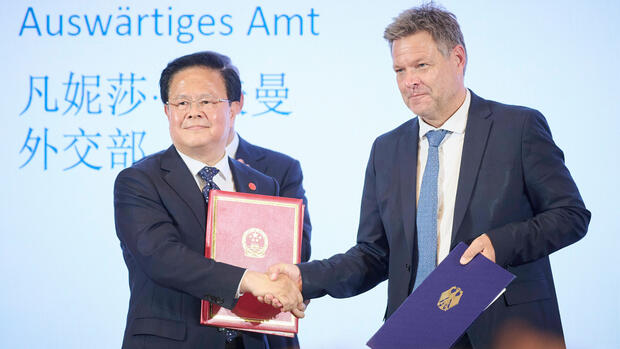Berlin Right on the front page of “Renmin Ribao”, the mouthpiece of the Chinese Communist Party, the photo that the Chinese leadership had been working towards for the past few months was emblazoned on Wednesday: 26 Chinese and German ministers together on a staircase in the Chancellery – in the Background 19 German, European and Chinese flags.
China’s Prime Minister Li Qiang was quoted as saying that the seventh German-Chinese intergovernmental consultations in Berlin were “efficient and pragmatic and led to fruitful results”. And the propaganda sheet also reproduced several of the many positive sentences that Chancellor Olaf Scholz (SPD) said publicly on Tuesday, for example that the mechanism of the government consultations reflects the “special importance of German-Chinese relations”. The German-Chinese government consultations in Berlin were therefore a complete success for China.
However, the conclusion in Germany, where the consultations were also closely observed, is much more sober than on the Chinese side. “The economic level continues to have a strong emphasis, other messages are lost in it,” says Janka Oertel, director of the Asia program at the think tank European Council on Foreign Relations. Berlin is making itself unnecessarily small, at least in terms of external impact, according to Oertel.
There were also dissatisfied voices within the German ministries. But that was less to do with the talks themselves. The participants agreed that these were quite critical. But the way in which the consultations were presented to the public by the Chancellery meant that many people lost sight of Berlin’s critical attitude.
There was at least one tangible success: the representatives of the federal government wrested concessions from the Chinese in the climate dialogue that had not existed before. In addition to the Economy Ministry, the Environment Ministry agreed with its Chinese counterpart on closer cooperation in the areas of environment, climate change and sustainable development.
Successes hardly communicated publicly
According to the ministry, Development Minister Svenja Schulze also took the opportunity to critically address China’s role as the largest bilateral state lender to many developing countries. A committed implementation of debt restructuring within the framework of the joint G20 framework set up for this purpose is necessary, it said. According to its own statements, the Ministry of Research emphasized “the increasingly difficult framework conditions for scientific cooperation”.
China demanded that no questions be allowed at the press briefing.
(Photo: IMAGO/Future Image)
But to the displeasure of the ministries, there was hardly any public communication about these small successes – they themselves had to leave the lead largely to Scholz at the request of the Chancellery.
Particular incomprehension on the part of the coalition partner was caused by the fact that at the press meeting between Li Qiang and the Federal Chancellor, pressure from the Chinese leadership meant that journalists were not allowed to ask any questions. “The fact that no questions should be allowed at such an important press conference is a no-go,” criticized Gyde Jensen, deputy chairman of the FDP parliamentary group. Scholz opted for a “one-sided cuddle course towards China,” said the Green foreign politician in the EU Parliament Reinhard Bütikofer.
Criticism also came from the opposition. “If Germany’s new China strategy includes giving in to Chinese demands and restricting press freedom in our own country, then good night,” wrote CDU foreign policymaker Norbert Röttgen on Twitter. Scholz made a serious mistake, said Michael Brand, human rights spokesman for the CDU/CSU parliamentary group. He had “embarrassed Germany in front of the whole free world, just to spare the nerves of Chinese dictators”.
Markus Söder welcomes Li Qiang
A spokesman for the Chancellery defended the decision on Wednesday: “The Chinese side said very clearly that they were not prepared to answer questions and would rather not have a press meeting at all.” gone this way. Such a situation is considered “wrong”, but the alternative would have been for Scholz to go to the press alone.
>> Read also: The consultations with China are out of time
Before China’s Prime Minister Li Qiang travels to France, he made a stopover in Bavaria, where he was opulently received by the Bavarian Prime Minister Markus Söder (CSU). Photos show a large table with numerous guests in a baroque hall. A visit to Siemens and BMW, both companies with important China business, followed on Wednesday.
The visit was due to the fact that Bavaria “is the economically strongest state in Germany”, Söder justified the unusual visit and referred to the long-standing and close cooperation between Bavaria and China, including partnerships with three Chinese provinces.
Citing government circles, the Reuters news agency reported that the initiative for the stopover in Munich came from the Chinese side. Söder spoke out against decoupling the economies. This is harmful to sectors such as the automotive or chemical industries. It’s about securing jobs.
More: European companies complain about the poor business environment in China
